Movie Review
 |
 |
 |
 |
 |
 |
 |
Conclave: The Patriarchal Church Is Dead
Rita Stewart
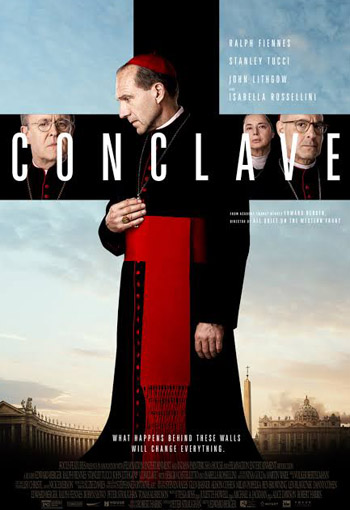
In better times, such a film would have been unthinkable, as its release would have prompted a universal boycott by Catholics. Today, only a smattering of Bishops have condemned Conclave, and the Pope himself has remained silent.
Among the general public, the film has been well-received, with critics lauding it as “intelligent entertainment” and a “thought-provoking thriller.” This indicates how far society has fallen, both morally and intellectually. Beneath the veneer of sophistication, the storyline is objectively weak, relying on over-sentimentality and cliché anti-Catholic tropes that invariably steer the undiscerning viewer to a cynical conclusion.
The Pope is dead…
The film begins with a scene at the papal apartment. The Vicar of Christ, presumably Pope Francis, has died. In an almost mechanical tone, several Prelates pray at his bedside, and another destroys the Papal Ring. Then, the Pope is promptly placed in a body bag and carried unceremoniously out of his apartment. One of the Cardinals weeps, but his tears seem driven by human sentiment and fear of the unknown future rather than the gravity of the occasion. There is no serious mention of the Four Last Things.
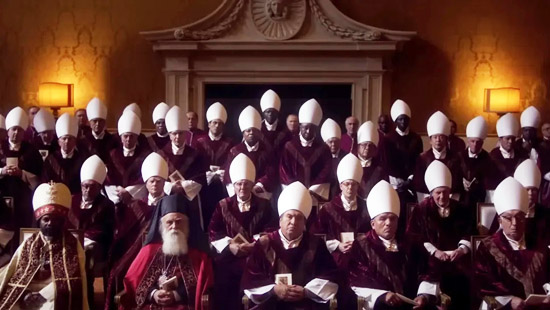
The Cardinals assemble & the games begin ...
The story then cuts ahead several weeks. All of the Cardinals have arrived in Rome for what should be a solemn and sacred occasion: the Papal Conclave. Unfortunately, it soon becomes apparent that this secret meeting guided by the Holy Spirit behind closed doors will devolve into nothing but a political game.
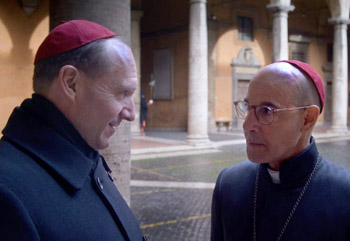
Cardinals Lawrence & the ultra-progressivist Bellini confer; below, the false-right conservative Tremblay is weak & insipid
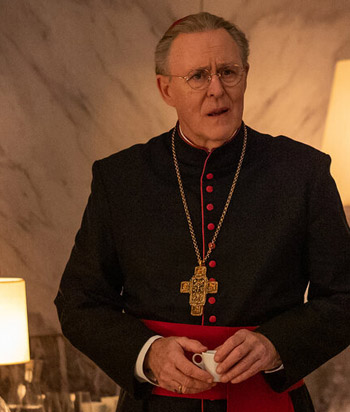
Soon, we meet the main contenders for the papacy. The most radical is the obnoxious Card. Bellini, an American liberal who comes dangerously close to openly defying the Church’s teaching on homosexuality. His rival is Card. Tedesco, a self-centered and irritable antagonist who is vilified for his good positions against Vatican II and the Novus Ordo. Other candidates include the insipid “middle of the road” Card. Tremblay and the false right Nigerian Card. Adeyemi.
The real star of the show, however, is the surprising late arrival: Card. Benitez of Kabul, Afghanistan. This unexpected disruptor with his long disarranged hair arrives in simple clothing and unkempt appearance. Because of religious persecution in his country, Benitez was made cardinal in secret (in pectore).
The others welcome the newcomer during a pre-conclave dinner, where Benitez offers the traditional blessing before meals, but then deviates into an improvised appeal to remember the poor and oppressed. While there is nothing heretical about this, it appears both egalitarian and pro-Marxist in this setting. Benitez’s very presence is a challenge to the Church’s traditional structure. In true progressivist fashion, the new Cardinal has set aside tradition in order to cut to the heart of the post-Conciliar faith: that is, “love.”
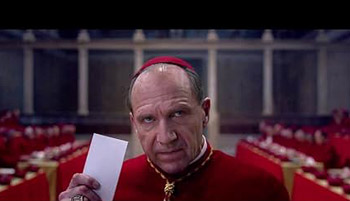
Card. Lawrence casting his vote:
‘Certainty is the deadly enemy of tolerance’
With this framework freshly present, the Conclave begins as an expected spectacle of moral failure. The solemn rituals, including the daily declaration in Latin - “I call as my witness Christ the Lord who will be my judge, that my vote is given to the one who before God I think should be elected” – is laced with irony.
It becomes clear that hardly anyone is voting for the most deserving candidate. Scandals soon surface, further tarnishing the process. Adeyemi fathered a child with a religious sister. Tremblay paid thousands of dollars to other Cardinals in exchange for their vote. Lawrence and Bellini appear to be spiritually adrift, seemingly having lost their faith altogether.
As the days pass, everyone begins to feel increasingly jaded. Some of the Cardinals repeatedly reference past scandals in the Church as a way to illustrate that all this is nothing new. There have been bad Popes before, many times.
A jarring and disjointed plot device marks the turning point in the Conclave. During the sixth round of voting, Islamic terrorists bomb the Vatican, directly hitting the Sistine Chapel. Several Cardinals are injured, and many more are covered with debris. Stunned, they all quickly exit the building and enter an auditorium.
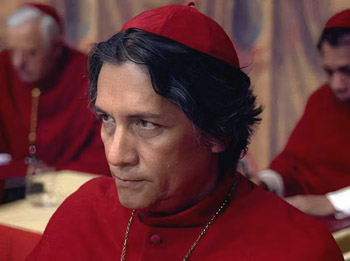
The surprise candidate Benitez, a ‘humble’ pacifist & biological woman...
During the next round of voting, the wind blows, signaling the presence of the Holy Ghost. The Cardinals rally behind Benitez, whom they elect. Their new Pope takes the name Innocent XIV, and everyone cheers.
If the movie ended here, there would already be much to criticize. Though some would argue that Conclave is a lesson about setting aside political divisions in the service of the greater good, it cannot be denied that Card. Benitez is also a leftist, perhaps more extreme than the others. Without the traditional doctrines of the Church, there can be no true unity.
Yet, the movie is still not over. In a subversive twist, Benitez reveals a secret to another Cardinal: he is, in fact, a biological female. Though appearing male at birth, he is a hermaphrodite, an intersex, with ovaries and a uterus. Although he had previously offered her resignation letter to the Pope, the latter told him to continue his sham “priesthood” and then appointed him “cardinal.”
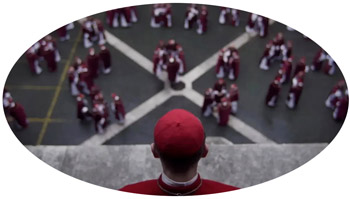
Presenting a corrupted hierarchy
filled with conspiracies & sscandals
This movie exposes the inherent contradictions in progressivist logic. Does the Holy Ghost guide the Church or does He not? Does He choose the Pope or not? How could such a flawed process result in exactly the Pope the progressivists hoped for?
Some might ask whether there is a grain of truth to the film. After all, many recent Popes have sabotaged the Church, and perhaps the Cardinals’ motives in selecting the Vicar of Christ have not always been pure. That is undeniable, but far from being a statement against progressivist corruption, the movie seems like an advertisement for Francis’ “reforms.”
The film casts a shadow of doubt onto the divine nature of the Faith, something that must be rejected entirely. If we wish to end the crisis in the Church, we must fight the Revolution, not join it. There is no merit in this movie. Do not go to see it.

Posted December 6, 2024
______________________
______________________





